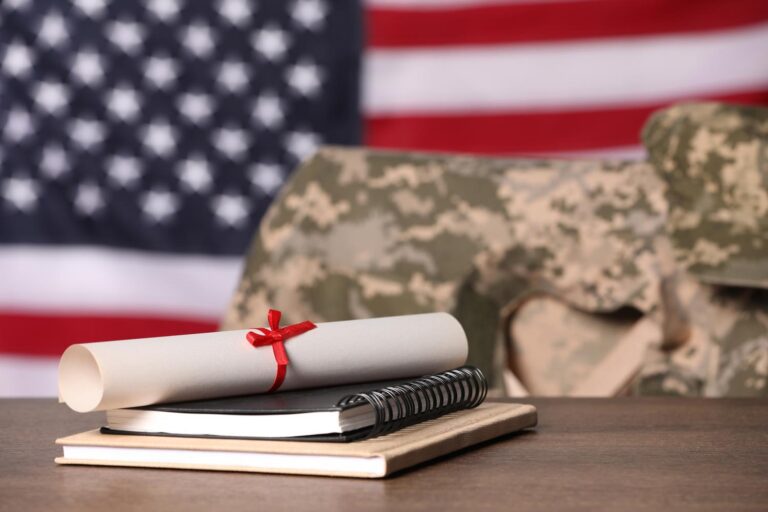Table of Contents
Following World War 2, the US government created the Servicemen’s Readjustment Act of 1944 to assist Veterans in transitioning from military to civilian life. In its present incarnation, it offers educational benefits, unemployment insurance, housing assistance, career assistance, and low-interest loans for businesses. Anyone who has ever served in the US military qualifies for at least a portion of the GI Bill, primarily for educational benefits. While the type and number of benefits vary based on your length of service and commitment, in general, Servicemembers coming out of the military have the opportunity to take advantage of the GI Bill to help finance their education. The Post 911 GI Bill Chapter 33 is one of the more popular aspects of this piece of legislation. The VA Chapter 33 GI Bill section oversees the educational benefits available to those who served in active duty after September 10, 2001, primarily.
What Is the Post-9/11 GI Bill (Chapter 33)?
A portion of the Servicemen’s Act known as Post 911 GI Bill Chapter 33 offers financial assistance to military members who served on active duty after September 10, 2001. It differs from other sections of the GI Bill, such as the Montgomery GI Bill, which provides educational benefits for active duty military members and Selective Reserve. However, Post 911 GI Bill Chapter 33 offers unique benefits, primarily providing 48 months of educational benefits to those who have served two or more qualifying periods of active duty, including some benefits not offered in other parts of the GI Bill. Moreover, Post 911 GI Bill Chapter 33 allows the military member to transfer these benefits to their spouse or dependent if they so choose something not applicable to other sections of the Act. The Post 911 GI Bill Chapter 33 offers a variety of other benefits, such as payment for educational materials and certifications, and is applicable to not just colleges and universities but also to vocational and trade schools. Many Veterans and Servicemembers who take advantage of their VA Chapter 33 GI Bill benefits complete secondary education and training programs that help them transition to civilian life following their military service. The VA Chapter 33 GI Bill expands upon previous benefits offered by the Montgomery GI Bill in that it covers a longer amount of time spent in school and covers some material expenses.
Some of the benefits offered by VA Chapter 33 include:
- Tuition and fees
- A monthly housing allowance
- A book and supplies stipend
- Qualifying licensing and certification test fees
- Prep courses for licensing and certification tests
- On-the-job training in apprenticeships
Online universities and courses approved by the VA also qualify for Post 911 GI Bill Chapter 33 benefits.
Eligibility Requirements for Chapter 33 GI Bill
Different portions of the GI Bill have different eligibility requirements, primarily based on the type of service to the military, the length of time, and a variety of other factors. The various GI Bill chapters apply to different military service situations and offer varying levels of benefits. The different GI Bill chapters also offer transitions if a Reservist moves from reserve to active duty, that Servicemember’s benefits move with him or her. For those applying for VA Chapter 33, the eligibility requirements are as follows:
- You served on active duty for at least 90 days after September 10, 2001, whether it was continuous or interrupted.
- You served for at least 30 continuous days after September 10, 2001, and were discharged with a service-connected disability.
- You received the Purple Heart after September 10, 2001.
- You are the dependent child or spouse of a qualifying Veteran or Servicemember.
- You are a member of the National Guard or Reserves who has served at least 90 days of qualifying service.
How to Apply for Post 911 GI Bill Chapter 33 Benefits
If you are ready to apply for Post 911 GI Bill Chapter 33 benefits, a good idea would first be to speak to a counselor at your local VA regional office to ensure that you fill out the necessary forms for your portion of the GI Bill, especially if you intend to apply for VA Chapter 33 GI Bill benefits. If you are not eligible for VA Chapter 33, you may be eligible for different GI Bill chapters. Additionally, it is advisable to consult with the admissions office of your preferred educational institution to confirm their acceptance of VA Chapter 33 benefits and to get answers to frequently asked questions about applying to their institution using GI Bill benefits. Also, be aware that your chosen educational institution may have specific requirements for applying and making admissions payments, so familiarize yourself with these before beginning the VA Chapter 33 application process. Typically, however, the process is as follows:
- Check eligibility: Determine that you are indeed eligible for the VA Chapter 33 benefits you plan to apply for.
- Gather your required documents: You will need your military service history, current address, contact information, and state-issued photo ID or military ID to apply for VA Chapter 33 GI Bill benefits.
- Complete the application: You can apply online, by mail, in person, or with the help of a professional for VA Chapter 33.
- Apply online: Download the application VA Form 22–1990 for Post 911 GI Bill Chapter 33 and upload it to VA.gov.
- Apply by mail: Download a copy of the form, fill it out, and mail it to the appropriate regional processing office specializing in VA Chapter 33.
- Apply in person: Visit a VA regional office and turn in the form and appropriate documents to a VA employee about your application for Post 911 GI Bill Chapter 33.
- With professional help: Work with a representative of your educational institution’s admissions office to fill out the appropriate form and turn in your paperwork. Your educational institution’s admissions specialist is likely already familiar with VA Chapter 33 benefits, and the specifics of the VA Chapter 33 GI Bill.
- Submit the application by the deadline: You have 60 days from the start of your application process to submit it. Once submitted, it might take up to 30 days for the VA to verify your VA Chapter 33 benefits and issue a certificate of eligibility. Turn in all appropriate documentation to your educational institution.
Post 911 GI Bill Chapter 33 payments to your institution begin when you start taking classes. Your institution receives these VA Chapter 33 payments every month.
Understanding Benefits Rates and Coverage under Chapter 33
The VA Chapter 33 GI Bill covers quite a few educational expenses, but these might vary depending on the length of time and service. The Post 911 GI Bill Chapter 33 rates include:
- At least 36 months: 100% of the maximum benefit
- At least 30 months, but less than 36 months: 90% of the maximum benefit
- At least 24 months, less than 30: 80% of the maximum benefit
- At least 18 months less than 24 months: 70% of benefit
- At least six months, less than 18 months: 60% of the maximum benefit
You can continue to receive these VA Chapter 33 benefits for up to 15 years after your release from active duty, and you can also transfer these benefits to your dependents. However, you can only transfer your VA Chapter 33 GI Bill benefits to someone else while you remain on active duty.
Frequently Asked Questions
If you have specific questions about your Chapter 33 benefits, do not hesitate to call the VA hotline at 888-442-4551. In the meantime, consider the following most asked questions about Chapter 33 benefits.
The VA Chapter 33 portion of the GI Bill covers tuition and fees at a certain percentage based on length of time and service, including some housing allowances for anyone enrolled at least halftime or more, a stipend for books and supplies, and, in some cases, covers some moving expenses, test fees, and prep courses.
The VA Chapter 33 portion of the GI Bill covers tuition and fees at a certain percentage based on length of time and service, including some housing allowances for anyone enrolled at least halftime or more, a stipend for books and supplies, and, in some cases, covers some moving expenses, test fees, and prep courses.
The military calculates benefits based on the type of service, primarily active duty, and the duration of active duty.
You can transfer any unused VA Chapter 33 benefits to a spouse or dependent if the Servicemember is still on active duty.
Yes, it is, but only for those who are enrolled in either half-time or full-time education.
Chapter 33 of the GI Bill is specific to Veterans who served on active duty after September 10, 2001. Post 911 GI Bill Chapter 33 offers broader educational benefits to the Servicemembers compared to older chapters of the GI Bill, including some coverage for full tuition at public and state colleges, housing allowances, and the ability to transfer these benefits to dependents. Specifically, the ability to transfer benefits to dependents is only applicable to the Post 911 GI Bill Chapter 33 portion of the GI Bill and not to other chapters such as the Montgomery GI Bill.
Yes, you can use VA Chapter 33 benefits for online courses. The Post 911 GI Bill Chapter 33 benefits also cover some certified online tests and certification courses.




